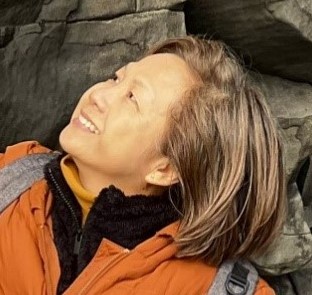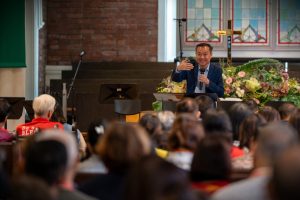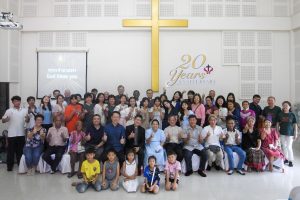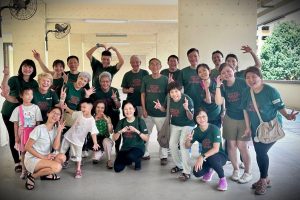Do you not know that your bodies are temples of the Holy Spirit, who is in you, whom you have received from God? (1 Corinthians 6:19)
More than a dozen ladies met purposefully on Saturday, 3 June, to hear nutrition recommendations from Ms Lau Tze Ching, Principal Dietitian at Singapore Cancer Society. Tze Ching has 15 years of clinical dietetics experience in acute hospital and step-down care. Her interest is in cancer and geriatric nutrition care. She enjoys sharing evidence-based nutrition tips to empower the public to practice healthy living and take charge of their health and well-being.
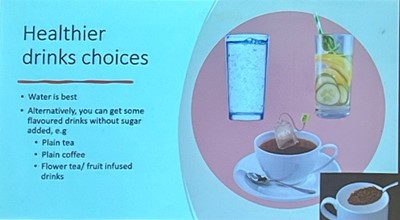
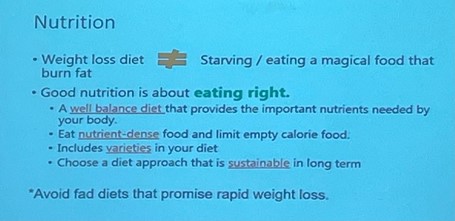
Vivien Goh, founding member of Wesley Women’s Cancer Support Group (WWCSG), hopes to have more of such cancer-related health talks to benefit cancer patients. “Participants were reassured to know what and what not to eat. I myself have become conscious of the ideal proportion of carbs to proteins and veggies.”
WWCSG participant and Small Group Zone Leader Saw Seang Mei said she benefited from the advice according to the Health Promotion Board’s ‘Healthy Plate’ diet and “not to follow fads, but to keep a healthy diet and lifestyle on a daily basis.”
Health complications can arise if weight is not effectively managed, yet, it’s not “No, you can’t eat it!” but, “Eat less” of foods that are deep fried, sweet, and starchy. From one’s genetics to types of nutritional foods to eat, lots of practical advice was offered. Eating out at hawker centres can be healthy too, as long as we make wise food choices. For example:
- Choose different-coloured veggies with Yong Tau Foo, or idli, a steamed South Indian rice cake and baked tandoori instead of roti prata or deep-fried chicken.
- Trim off skin from meats, avoid sauces, and drink less gravy or coconut milk from mee rebus and curry dishes.
Cathryn Tan, chairperson of WWCSG, found the talk “an eye opener”—especially the calories found in popular foods when eating out; and that a lack of sleep can cause her to “crave for unhealthy snacks.”
Purpose-Driven Ministry
According to Cathryn, the Ministry began in 2002 to help the recovery of women recently diagnosed with cancer and to support their families and caregivers. “Having received God’s sustaining grace and strength to live normal lives, we want others in a similar plight to receive spiritual and emotional support by providing them a safe environment to talk about their fears and concerns.”
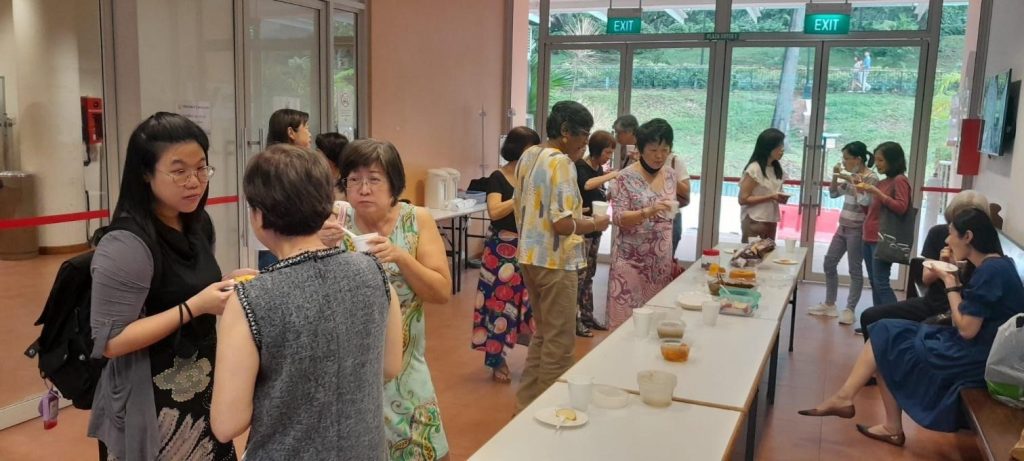
Having cancer can make eating nutritionally well challenging. Side effects of cancer and cancer treatment can cause changes to one’s appetite and weight. While some treatments result in loss of appetite leading to weight loss, others can cause weight gain.
Even with normal weight, women with apple-shaped abdomens (large waist circumference) that have too much belly fat are at greater risk for heart disease, high cholesterol, type 2 diabetes, and cancer, compared to those who are pear-shaped (tapered-at-top oval). Eating wholegrain foods like brown or wild rice, and oatmeal instead of nutrient and fibre-lacking refined grains, can help shrink belly fat and reduce health risks. When one is overweight, even a small weight loss of 5–10 percent can help lower the risk of disease no matter the body shape. While genes cannot be changed, adopting a healthy eating plan and active lifestyle can definitely help to reduce the risk of cancer.
Active Learning
Committee member Flora Yan found the talk educational as it provided useful tips on what and how much to eat. Participants listened attentively to other beneficial advice during the Q&A session, such as:
- Cut out alcohol and junk food snacks as the first thing to do, even before reducing food portion sizes.
- Starchy vegetables contain more calories compared to leafy vegetables.
- Thwart hunger pangs by eating higher fibre food such as wholegrains, vegetables, and fruits.
As for healthier cooking oils, monounsaturated oil is best while trans fat is deadly. Certain oils with lower smoke point, like sesame oil and extra virgin olive oil, create dangerous free radicals when broken down by high heat. Some nutrients like biotin, found in eggs, are better absorbed when fully cooked. Taking adequate omega 3 can help reduce inflammation in the body and preserve muscles in patients with cancer.
Said Tze Ching, “Carbs is an important nutrient in a balanced diet. We should therefore include more wholegrain in our diet instead of cutting them out totally. Although fibre is beneficial, don’t go overboard and consume too much which may cause unwanted issues like bloatedness and discomfort. Practise mindful eating. Don’t order more than what you can eat, and eat less buffets if you have difficulty controlling your food portions. The secret is to eat everything in moderation.”
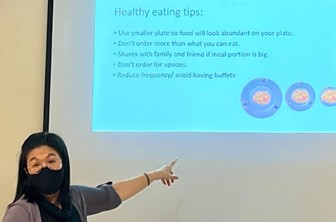
Participant Susan Fong is now alert to the warning that obesity brings a higher risk of cancer and other health issues. “To achieve and maintain good weight, I need to eat a healthy, well-balanced diet, have adequate sleep, and stay active with daily exercise.” Like Susan, committee member Jean Lee is now “more careful not to overeat”. “Now that I’m more aware of which foods are beneficial for my body, I’ll choose to eat less of the ‘bad’ and more of the right foods in the right amounts.” She hopes that WWCSG can introduce exercise sessions with music to help members keep active.
Tze Ching also debunked certain myths like “sugar feeds cancer cells” or “some sugars are better than others”. Adding flavourful herbs and spices like lemon, garlic, or rosemary instead of sugar and salt can enhance food that tastes bland. WWCSG Vice Chairperson Karen Yeo is glad to have “dispelled myths about certain cancer-causing foods,” adding, “I’m able to better manage my food options now that I understand the caloric content and nutritional value of foods.”
Participant Cindy Chong found the talk “resourceful and interactive”. It also reminded her about some basic nutrition knowledge she had learnt earlier. “I am now more conscious,” she reflects, “when choosing the right cooking oil and cooking methods to get healthy meals.” Like Vice Chairperson Karen, she has also had her “doubts cleared regarding the truth about certain foods.”
Along with weight loss goals that have to be realistic and maintained once achieved, there must also be lifestyle changes. These include sleeping 7–9 hours daily and exercising to maintain and build muscle mass. The recommended weight loss for obesity is 5–10 percent over 6 months (0.5–1kg loss per week), supported by 150–300 minutes of aerobic workouts (e.g., brisk walking, swimming, cycling) at moderate intensity per week, together with muscle strengthening exercises (e.g., use of resistance bands, dumbbells, etc.) twice a week. For all participants, the takeaways are:
- Eat a well-balanced diet that contains essential nutrients like vitamins, minerals, protein, carbohydrates, fats, fibre, and water.
- Be as active as you can— go for daily walks instead of sitting or sleeping too much, which will result in loss of muscle mass and gain in body fat.
- Monitor your weight regularly to keep it within a healthy range.
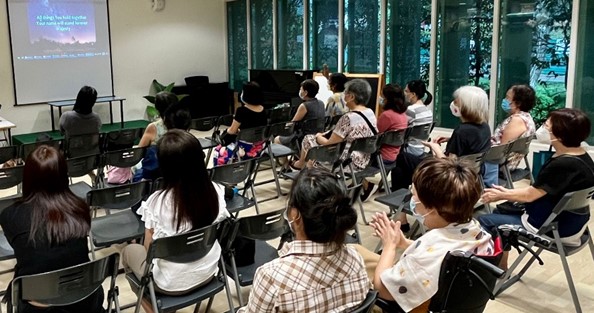
One Body in Christ
Finding the talk informative and beneficial, participants plied Tze Ching with questions during the Q&A session. For cancer survivors, eating a nutritious diet, as well as staying physically active and paying attention to drastic weight changes, staves off the risk of other health conditions following cancer treatment.
Positively victorious like her fellow survivors, participant Cindy appreciates the “meaningful” activities WWCSG organises, such as Art & Craft, singing, aerobics, and learning to cook nourishing dessert soups. Additionally, there are Bible Study sessions, relaxing walks, farm visits, workshops, and talks by oncologists, psychological and occupational therapists.
By God’s grace and leading, WWCSG reflects a united and welcoming family in the Wesley church community, so that all who are similarly afflicted might be encouraged to proclaim, “I walk in the LORD’s presence as I live here on earth!” (Psalm 116:9, NLT)
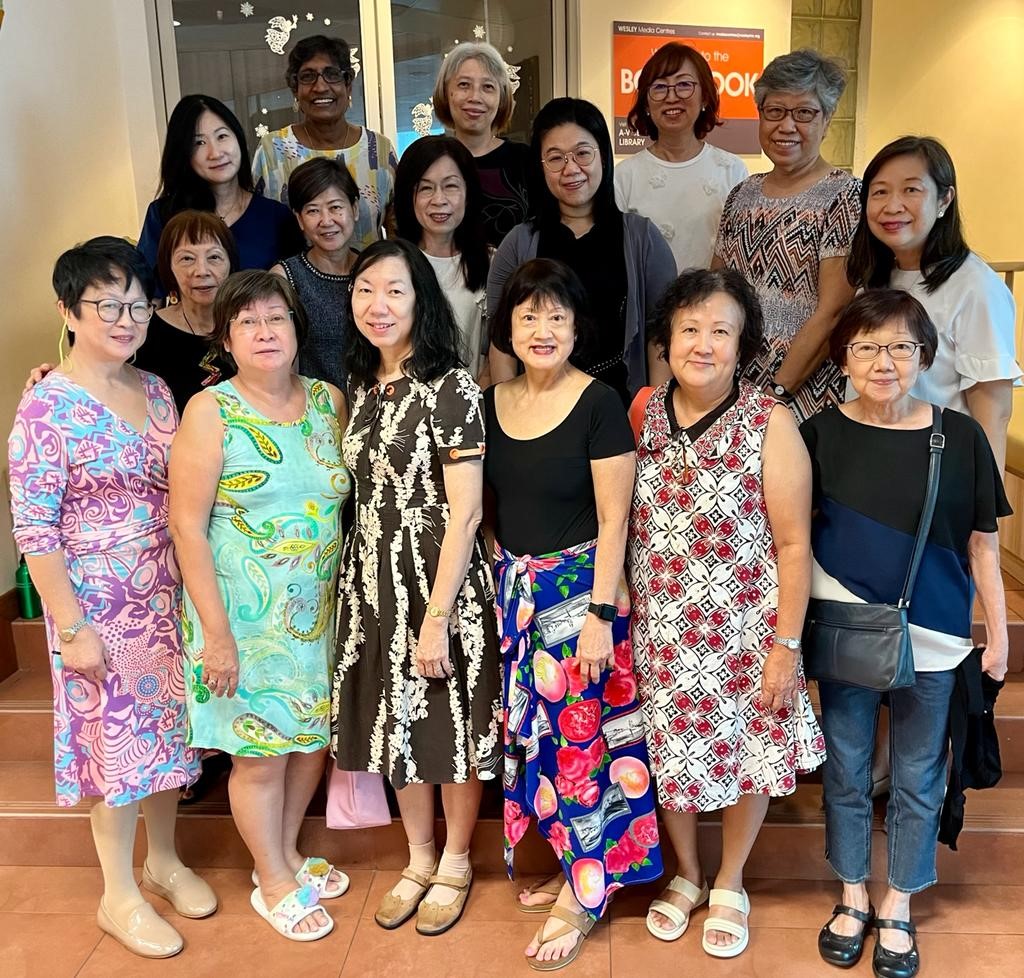
Photos by Marjorie Tan
Read also: ‘A Consecrated Time’: Strangely Warmed Retreat by WMC on 28 -30 April 2023


